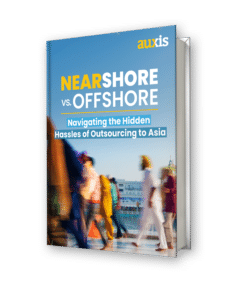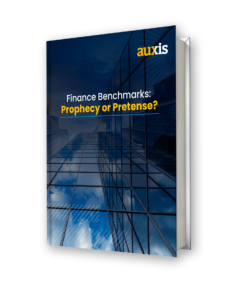Why outsourcing accounting is clear: it enables CFOs to reduce costs, improve productivity and efficiency, alleviate the industry’s talent crunch, and increase their internal focus on more strategic activities.
With the pandemic adding new urgency for CFOs to build Modern Finance Departments and accelerate digital transformation, the global finance outsourcing market is projected to grow more than 40% by 2027, surpassing $50 billion, according to ReportLinker.
And with a whopping 82% of accounting professionals describing the month-end close as a negative experience, General Accounting stands out as a main finance area that is ripe for improvement.
Similar to AP and AR, General Accounting also includes many repetitive, transactional, low-value activities that are great candidates for outsourcing. Even the management of the month-end close process can be transferred to an experienced Finance outsourcing partner with the right technology in place.
Now that you are clear on why outsourcing accounting makes sense, let’s examine what are the key accounting processes that you should consider outsourcing versus retaining in-house across three core areas:
1. Journal Entries
The challenge:
Many F&A Departments experience a delayed, overly painful journal entry process that triggers bottlenecks and inefficiency during the month-end close. With loosely governed procedures and little or no process documentation, organizations lack insight into the types of journal entries performed, who records them and when, who should perform approvals, or the risk, frequency, and complexity of each entry.
High volumes of low-value journal entries clog the process and consume too much bandwidth from senior-level employees. At the same time, with the high volume of journal entries being processed, some of the more complex and higher-risk entries may be assigned to less experienced accountants, increasing the opportunities for errors.
Many organizations also lack a single mechanism for tracking, approving, and saving documentation – increasing the risk of delays and errors.
The abundance of manual processes creates more challenges, making it all too easy to enter data incorrectly and forcing staff to manage complex Excel spreadsheets for calculations. It also makes preemptive validation difficult, causing some journal entries to get posted and rejected multiple times before successful completion.
What to outsource:
Low-risk journal entries with low complexity are prime candidates for F&A outsourcing. For instance, journal entries without complex calculations or those having a low impact on the Profit & Loss Statement (P&L) are good examples of transactions to outsource. A reputable BPO team can also perform the approvals for these types of journal entries.
As comfort levels increase, many organizations also choose to offload more complex and higher-risk journal entries to their BPO provider. However, it is important to review the approvals for these types of entries to ensure that there is effective oversight to the overall process.
2. Account Reconciliations
The challenge:
Account reconciliations are essential to ensuring the integrity of financial reporting. Yet, it’s not unusual for time-crunched accounting teams to start reconciliations after results are reported – or overlook them entirely.
The growing complexity and number of accounts requiring reconciliation add to the challenge. Many enterprises also lack a single tool with robust workflows for tracking approvals and storing supporting documentation.
Without a well-structured process, organizations can quickly lose sight of all the types of reconciliations, who should perform them and when, levels of risk and complexity, responsibility for approvals, etc. As a result, open items are often left sitting on the books for months, and write-off policies are undefined or not managed carefully.
The common use of manual spreadsheets makes the process even more cumbersome and error-prone. A lack of standardized processes is another issue, with varying spreadsheet formats and information scattered across different systems increasing complexity. This also makes it more difficult to maintain consistency in the operation if you need to transition this work to another resource, if people leave or their jobs change.
Some 44% of accounting professionals rank the difficulty of reconciling items across multiple systems as a top F&A challenge.
What to outsource:
In most cases, organizations can offload the entire reconciliation process to a reputable FAO partner. However, internal teams may choose to retain approvals for complex, high-risk reconciliations identified during the migration process to ensure effective overall overisght.
Look for providers with best practices for finalizing reconciliations for every account before the books close, including bank, AR, AP, inventory, fixed assets, prepaid, and more. Exceptional BPO partners will also help clean up open reconciliations during their migration process, resolving or writing off balances to start with a clean slate.
3. Month-End Close
The challenge:
A whopping 75% of accounting professionals lack confidence in the accuracy of their last close, according to a Journal of Accountancy report. Nearly 90% work overtime closing the books – and 25% said closing pressures prompted employees to leave their organization.
So, where does the system break down?
Traditionally, month-end close processes are paper-clogged and poorly documented, with laborious or non-existent workflows. Not surprisingly, this leaves staff with little understanding of stakeholders, bottlenecks, and what should happen on a daily basis to optimize their end-to-end processes.
Lack of documentation also leads to “tribal knowledge,” with critical knowledge for performing tasks retained by sole employees. Important modules like AP often don’t integrate with the ERP system, rendering automations useless and forcing staff to revert to manual processes and many reviews and reconciliations to ensure numbers make sense.
Outdated technology, poor information flow between siloed departments, a confusing approval process, and little time for developing process improvements further add to the challenge.
Even worse, with no mechanism for tracking status, busy accounting staff rarely start financial close activities until the end of the month.
Unfortunately, that leaves them scrambling to resolve issues like missing approvals or unreported customer or supplier invoices – making it difficult to close modules accurately and on time. Closing activities can stretch 10 days or more.
And companies become locked in a vicious, “rinse-and-repeat” cycle of closing the books and account reconciliations that consumes every month, with no time left for providing insight to key stakeholders.
What to outsource:
One of the advantages of outsourcing accounting services is that it can help optimize most month-end close activities, from recording operational transactions to preparing financial statements. However, organizations may choose to retain sensitive, complex, and/or higher-risk activities identified during your provider’s migration process.
To ensure optimal process improvements, look for FAO partners with a proven track record of uniting siloed stakeholders to build future-state processes with the outsourcer.
What to look for in your accounting outsourcing partner
As you evaluate your potential outsourcing partners, look for providers with a robust methodology for migrating accounting processes to outsourced teams, including thorough process review, detailed walkthroughs of every process, As-Is and To-Be flowcharts, and the creation of clear Standard Operating Procedures (SOPs) with explanations of supporting documents for each process.
Exceptional providers have the business expertise to streamline inefficient processes and can provide workflow and automation tools to improve speed, accuracy, and control. They also implement financial close task management tools such as Trintech (Cadency or Adra), or Blackline to track month-end close, journal entries, and reconciliation activities and due dates in a methodically organized system.
Task management tools improve ownership and accountability for each step in the process, including elusive approvals. These tools also provide dashboards and reports that create visibility, identify bottlenecks, and highlight areas for improvement.
Another key consideration is the location of your outsourcing partner and whether they are working under your same time zone or not. Nearshore destinations like Costa Rica or Colombia can provide many advantages to US companies in terms of closer collaboration and communication in real-time.
Your ideal FAO partner should be able to deliver end-to-end Accounting outsourcing services with best-in-class talent, practices, and technology – maximizing the performance of your finance operation and freeing your internal team to become a true business partner.






